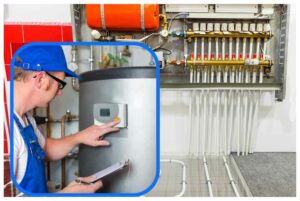What are The Disadvantages of Hot Water Heating Systems?
Hot water heating systems, a popular choice for keeping our homes cozy during the chilly months, operate by circulating heated water through radiators or underfloor pipes. While offering consistent indoor temperatures and several advantages, these systems also have downsides. For those considering upgrades or installations, exploring grants for heating installation can be a valuable step. This comprehensive exploration will delve into the disadvantages of hot water heating systems, providing a balanced view to help you decide about your home’s heating needs.
Common Disadvantages of Hot Water Heating Systems
While hot water heating systems offer numerous advantages, they do have their downsides, including:

Energy Inefficiency
Hot water systems often face heat loss during water circulation, which increases energy consumption. In traditional systems, the challenge is that the water is constantly heated, even when it’s not in use, leading to substantial energy intensity.
Modern systems, like condensing boilers, have been introduced to enhance efficiency and tackle this issue. These boilers are adept at capturing and reusing heat that would typically be lost, thus significantly improving energy efficiency. A critical aspect of these systems is to Check Water Pumps in Hydronic Heating Systems. This step is vital because well-maintained water pumps ensure efficient heat distribution and minimize energy waste.
Historically, hot water heating systems have been critiqued for their energy inefficiency, often resulting in higher utility bills. This inefficiency primarily stems from the continuous heating of water, regardless of actual heat demand. However, the advent of modern technologies in hot water heating systems, such as condensing boilers, has led to a marked improvement in energy efficiency. By adopting these advanced technologies, homeowners can significantly reduce the energy inefficiency of traditional hot water heating systems.
Installation and Maintenance Costs
The initial installation costs of hot water systems can be significant, and ongoing maintenance expenses are also a consideration. The system’s complexity, including boilers, pipes, and heat emitters, can contribute to higher installation costs.
Budgeting for these costs and exploring maintenance plans can help manage expenses. Homeowners opt for DIY maintenance tasks, but professional servicing is essential for the system’s long-term health.
Installing a hot water heating system can be a substantial financial investment. The system’s complexity, which includes boilers, pipes, and heat emitters, can contribute to higher installation costs. While necessary for system longevity, ongoing maintenance expenses can add to the overall cost of ownership.
To mitigate these costs, homeowners should consider budgeting for initial installation and future maintenance. Homeowners perform specific maintenance tasks like bleeding radiators or checking for leaks. It’s essential to emphasize the importance of professional servicing for critical components like the boiler to ensure the system’s long-term health and efficiency.
Space Requirements
Hot water systems require space for boilers, pipes, and heat emitters, impacting home design and renovation possibilities. The need for adequate space can limit furniture placement or affect your home’s layout.
Creative design solutions can maximize space usage while accommodating the system’s components. For example, choosing sleek and space-saving radiators or opting for underfloor heating can help free up room space.
Hot water heating systems can be space-intensive, requiring areas for boilers, pipes, and heat emitters. This need for space can impact home design and renovation possibilities, limiting the placement of furniture or affecting the layout of your home.
Homeowners have options to address this challenge creatively. Choosing sleek and space-saving radiators can minimize the impact on room space. Underfloor heating systems provide a discreet and efficient heating solution that doesn’t interfere with room layout. By exploring these design options, homeowners can maximize space usage while accommodating the components of their hot water heating system.
Slow Response Time
Hot water heating systems respond slower when adjusting the thermostat, resulting in delayed temperature changes. This can be frustrating if you want to warm up your living space quickly.
Adapting to the system’s response time and using programmable thermostats can improve comfort. By setting a schedule, you can ensure that your home reaches the desired temperature when needed. Modern systems offer faster response times.
One drawback of hot water heating systems is their slower response time when adjusting the thermostat. Unlike forced-air systems that provide almost instant temperature changes, hot water systems take longer to reach the desired temperature. This slower response time can be frustrating, especially when you want to warm up your living space quickly.
To mitigate this issue, homeowners can adapt to the system’s response time by planning ahead. Using programmable thermostats, you can set a schedule that ensures your home reaches the desired temperature when you need it. Modern hot water heating systems offer faster response times, addressing this concern and improving overall comfort.
Risk of Water Damage
Leaks or malfunctions in hot water systems can lead to water damage within your property. The presence of water in the system means that there is always a potential for leaks, and a significant leak can result in costly repairs and damage to your home.
Regular maintenance and vigilant monitoring can reduce the risk of water damage. Periodic inspections and addressing any issues promptly can prevent minor problems from turning into major water-related disasters.
Hot water heating systems inherently carry the risk of water damage. Any system that involves water circulation has the potential for leaks or malfunctions, which can result in water damage within your property. A significant leak can lead to costly repairs and damage to your home’s structure and belongings.
To mitigate the risk of water damage, homeowners should prioritize regular maintenance and vigilant monitoring of their hot water heating system. Periodic inspections by qualified technicians can identify potential issues before they escalate. Addressing problems promptly can prevent small leaks or malfunctions from becoming major water-related disasters.
Limited Zoning Control
While traditionally popular, hot water systems often struggle with zoning control, leading to uneven heating in homes. This issue is particularly noticeable in larger spaces, such as the challenge of achieving an Efficient and Economical Way of Heating a Church Sanctuary, where the need for balanced temperature control is crucial. Some rooms might end up too warm in such settings, while others remain too cold.
To overcome this, exploring advanced hot water heating systems equipped with enhanced zoning capabilities is advisable. Implementing zone valves and thermostats enables independent temperature regulation in different areas, aligning with the unique needs of large spaces like church sanctuaries. This targeted approach ensures personalized comfort for various sections and contributes to more efficient heating. By focusing heating resources where they are most needed, these modern systems offer a practical solution for large spaces, ensuring comfort without excessive energy use.
Aging Infrastructure
Older hot water systems operate less efficiently and require costly upgrades or replacements. Over time, the components of the system, including the boiler and pipes, can deteriorate, leading to reduced performance.
Investing in energy-efficient upgrades can improve system performance. Upgrading to a more efficient boiler or adding insulation to the pipes can enhance the efficiency and longevity of your hot water heating system. Regular maintenance checks can also identify and address issues before they become significant problems.
As hot water heating systems age, they operate less efficiently, and their components can deteriorate, leading to reduced performance. Older boilers become less efficient and require more fuel to produce the same heat.
To mitigate the effects of aging infrastructure, homeowners can consider investing in energy-efficient upgrades. Upgrading to a more efficient boiler can significantly improve the system’s performance and reduce energy consumption. Adding insulation to the pipes can prevent heat loss and improve overall efficiency. Regular maintenance checks by qualified technicians can also identify and address issues before they become significant problems, extending the system’s lifespan.
Conclusion
In conclusion, hot water heating systems have their share of disadvantages but continue to be famous for homeowners looking for reliable and consistent heating. By understanding these drawbacks and exploring potential solutions, you can make an informed decision about heating your home. Whether you choose a hot water system or an alternative heating method, regular maintenance and attention to efficiency can ensure your house stays warm and comfortable throughout the colder months.



